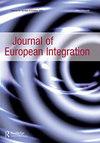De-Europeanization as discursive disengagement: has Georgia “got lost” on its way to European integration?
IF 3.1
1区 社会学
Q1 INTERNATIONAL RELATIONS
引用次数: 0
Abstract
This article looks at de-Europeanization as a progressive disengagement between domestic authorities and EU actors manifested through their discourses. The authors view discursive disengagement as consisting of two major aspects: Discursive opposition between domestic authorities and the EU reflected in their conflicting statements and the intensification of this discursive opposition, whereby the domestic authorities’ discourses shift from defensive to offensive ones. The authors trace the respective developments based on the case of Georgia, looking at the discursive interaction between domestic and EU actors in the Georgian TV media from July 2021 to June 2022. The research has revealed Georgian authorities’ discursive opposition to EU actors behind the façade of seemingly pro-European statements. After Russia’s invasion of Ukraine, this discursive opposition has escalated and become offensive. The authors use quantitative content analysis to map actor-discourse networks, as well as critical discourse analysis to reveal deeper layers of de-Europeanization discourse.作为话语脱离的去欧洲化:格鲁吉亚在通往欧洲一体化的道路上“迷失”了吗?
本文将去欧洲化视为国内当局与欧盟行动者之间通过其话语表现出来的渐进式脱离接触。作者认为,话语脱离包括两个主要方面:一是国内当局与欧盟之间的话语对立,反映在他们相互冲突的言论上;二是这种话语对立的加剧,国内当局的话语从防御性转向进攻性。作者以格鲁吉亚为例追溯了各自的发展,考察了2021年7月至2022年6月格鲁吉亚电视媒体中国内和欧盟行动者之间的话语互动。这项研究揭示了格鲁吉亚当局在表面上亲欧言论背后对欧盟行为者的口头反对。在俄罗斯入侵乌克兰之后,这种言论的反对已经升级并变得具有攻击性。作者使用定量内容分析来绘制行为者-话语网络,以及批判性话语分析来揭示去欧洲化话语的更深层次。
本文章由计算机程序翻译,如有差异,请以英文原文为准。
求助全文
约1分钟内获得全文
求助全文

 求助内容:
求助内容: 应助结果提醒方式:
应助结果提醒方式:


